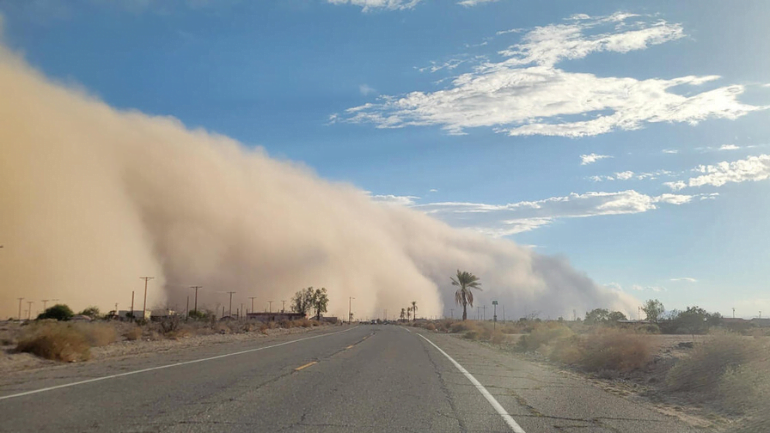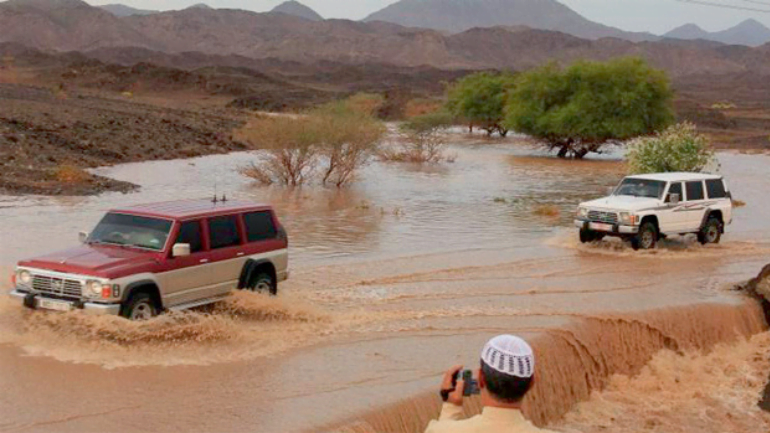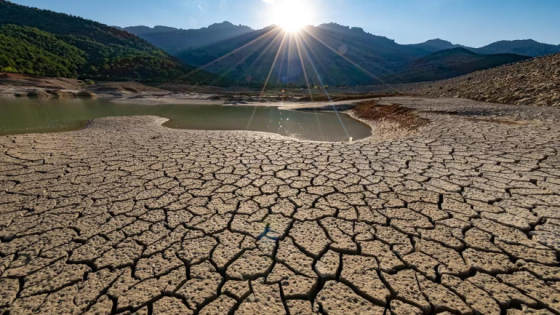Contents
Extreme Weather Events in UAE, United Arab Emirates offers a delightful escape for vacationers looking to leave behind dreary skies, constant heating, and the hassle of avoiding puddles. However, long-term residents are aware that the climate here goes beyond simply sporting Ray-Bans and slathering on sun cream.
In the mornings, as the curtains are pulled back, one can expect to be greeted by a gentle hue of pale blue that persists throughout the day. Nevertheless, certain regions of the country experience a more diverse climate, with frequent occurrences that deviate from this norm.
Extreme Weather Events in UAE
Here are 4 of the most dangerous extreme weather events in UAE which occur annually depending on the season:
Heatwave
One of the most notable extreme weather events in UAE is the heatwave. With scorching temperatures reaching up to 50°C (122°F), heatwaves pose a serious threat to human health and well-being. Apart from the discomfort and physical stress they cause, heatwaves can lead to heatstroke and dehydration, especially among vulnerable populations such as the elderly and children. Additionally, high temperatures can also cause damage to infrastructure, including roads and buildings, as well as impact the agriculture sector by drying up water sources and harming crops.
Dust storms or “Haboobs”

Dust storms, locally known as “Haboobs,” are frequent extreme weather events in UAE. These storms transport large amounts of dust and sand, reducing visibility and affecting air quality. Dust storms can lead to respiratory problems, such as asthma and bronchitis, as well as eye irritation. The fine dust particles carried by the winds can also settle on infrastructure, affecting the efficiency of solar panels and causing damage to machinery. Moreover, the agricultural sector also suffers from dust storms, as the particles settle on crops, reducing their productivity.
Heavy rainfall and flash floods
Another extreme weather event in UAE is heavy rainfall and flash floods. While the country is known for its aridity, sudden downpours during the winter months can result in flash floods. Due to the lack of well-established drainage systems, rainwater often accumulates rapidly, inundating city streets and disrupting daily life. Flash floods can also trigger landslides and damage infrastructure. In addition, heavy rainfall can expose the vulnerability of informal settlements and low-income areas, as they often lack proper housing and face increased risks of flooding.
Read more: UAE Weather Patterns
The effect of extreme weather events in UAE

The consequences of these extreme weather events in UAE go beyond immediate health and infrastructure concerns. They also impact various sectors of the UAE’s economy. For example, the tourism sector, which is a vital source of income for the country, is affected by these events. Heatwaves make outdoor activities less enjoyable and pose health risks to tourists, potentially discouraging visits during certain times of the year. Likewise, heavy rainfall can disrupt travel plans and dampen tourism activities. Dust storms may limit visibility and discourage visitors from exploring popular outdoor attractions.
Read more: Climate change in UAE
Government steps to relieve extreme weather events effects
The UAE government has recognized the significance of extreme weather events and has taken steps to mitigate their impacts. For instance, the National Centers for Environmental Prediction (NCEP) provides real-time weather updates, allowing residents and tourists to stay informed and take necessary precautions. The NCM also issues warnings and advisories during extreme weather events to ensure public safety.
Additionally, the UAE has invested in infrastructure to better prepare for extreme weather events. Drainage systems in urban areas have been improved to mitigate the impact of heavy rainfall and reduce the risk of flash floods. The country has also invested in renewable energy sources, such as solar power, to diversify its energy mix and reduce the reliance on fossil fuels, thereby decreasing the contribution to climate change.
Read more: Average temperature in UAE
Which country has the most extreme weather events
The United States.
What is the highest recorded temperature in the UAE?
52.1ºC (125.78ºF).
In conclusion, extreme weather events in UAE, including heatwaves, heavy rainfall, and dust storms, pose significant challenges to the country. These events have adverse effects on human health, infrastructure, and economic sectors such as tourism and agriculture. Nonetheless, the UAE government has recognized the need for proactive measures and has invested in technology and infrastructure to mitigate the impacts of these extreme weather events. Moving forward, continued efforts and investments will be crucial to adapt to the changing climate and build resilience for the future.













